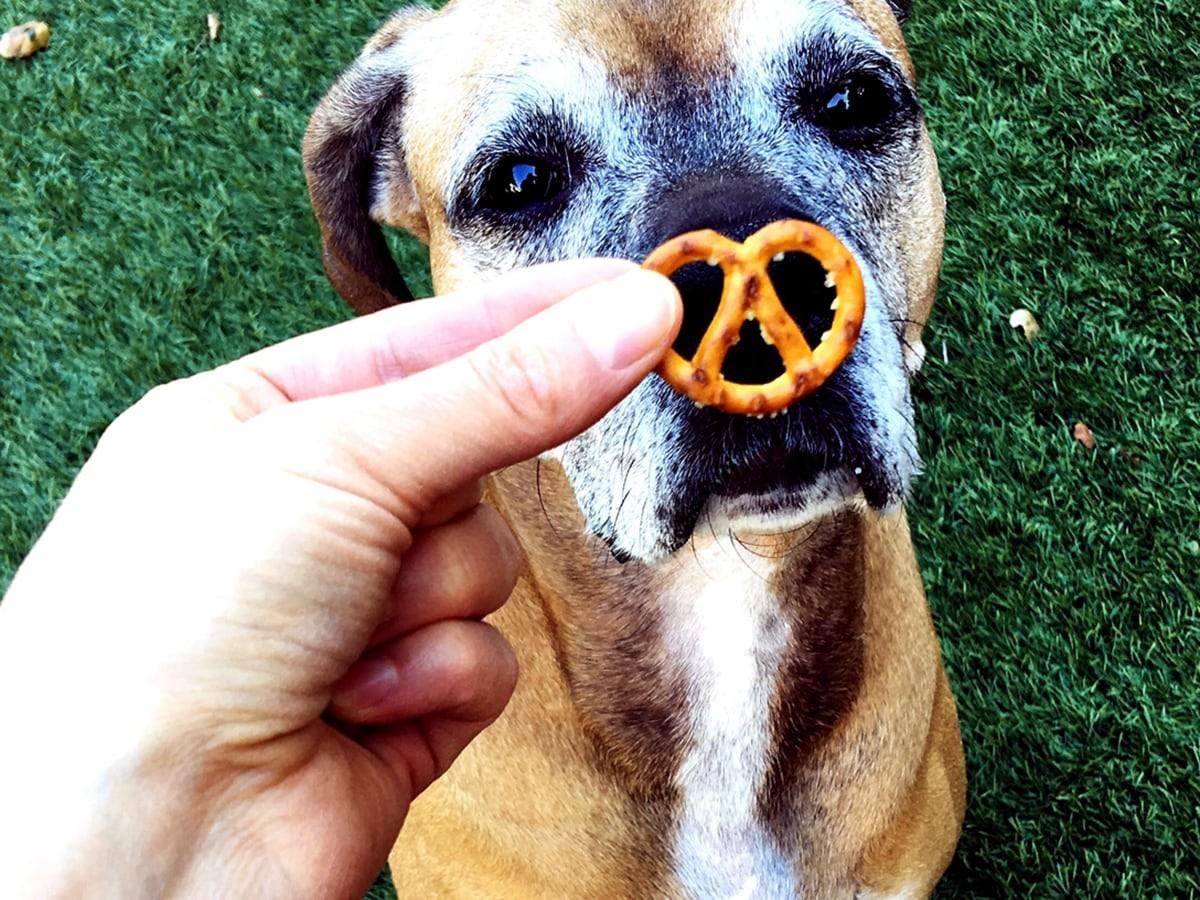Pretzels are fun baked snacks that are quite flexible. Soft pretzels are a carnival favorite and are warm, fluffy, salty treats. Hard pretzels are typically found in supermarkets, and they’re small crunchy snacks that are much more convenient. Both can be salty and savory eatables with yummy seasonings and dipped in cheese or mustard. On the other hand, they can both be sweet snacks to be dipped in hazelnut spread or marshmallow fluff, or entirely coated in chocolate!
One soft pretzel contains about 245 more calories than an ounce and a half of hard pretzels, plus more grams of fat and carbs, making hard pretzels the go-to snack for nutrition. Since they’re essentially made of bread, they are a more “carby” snack. Still, pretzels are a decent source of vitamins and extra nutrients for humans when eaten in moderation.
How nutritionally sound are pretzels to our dogs, though? If they got into a bag of our favorite pretzels, would we feel safe, or should we call a veterinarian? Finally, what are some other foods that we can feel confident giving to our dogs?
Why Your Dog Shouldn’t Have Pretzels
It might not be such a bad thing if your dog ate a leftover pretzel mistakenly dropped on the floor, but they shouldn’t be given handfuls. Regardless of what kind of pretzel you get, they will be high in salts and sugars which can be problematic for a dog’s digestive system. Being that pretzels contain a lot of carbs as well; dogs shouldn’t be fed pretzels at all.
The combination of carbohydrates, salts, sugars, coatings, and seasonings could be detrimental to a dog’s health. If they do happen to eat a couple of pretzels, they should be fine and likely won’t have to go to a hospital. Still, you should monitor your dog’s digestive process and make sure they have not been adversely affected.
Soft pretzels may pose more of a health risk than hard store-bought pretzels since their soft nature makes them harder to swallow, and they contain higher traces of salts and carbohydrates than their harder counterparts.
Carbohydrates
Dogs have a minuscule nutritional need for carbs. As ancestral carnivores, they can get everything they require nutritionally from meats that contain proteins and fats. Over time, their diets have evolved from those of a wolf, and have begun to adapt to more grains and carbohydrates. This is thanks, in part, to dog food marketing and the addition of grains to create more dog food for less money.
Still, when excess carbohydrates are available in dog food or table foods they eat, it can change the way they function. They become less energetic, which could be the culprit for obesity and high blood sugar. Obesity is as common in American dogs as it is in humans. It’s a preventable condition that can cause dogs to have shorter, harder lives. Overall, obesity increases the risks involved with diabetes, bladder stones, hypertension, osteoporosis, and more.
Seasonings
Pretzels with seasonings can be problematic for dogs’ health. For those of us who like to enjoy pretzels with a little extra kick, these are the types of pretzels you want to pay attention to. Many different flavorings contain garlic salt or onion powder. Onions and garlic are vegetables that contain thiosulfate, which can cause red blood cell damage in dogs which can cause anemia and eventually death if eaten too often.
These two ingredients are considered some of the most essential ingredients found in seasonings and foods. Some of us like our snacks to be spicy. Cayenne pepper may not have any poisonous factors for dogs, but it can serve as irritants to a dog’s eyes and nose. Nutmeg is a favorite seasoning for baked snacks like soft pretzels. This seasoning is also harmful to many pets due to the existence of Myristicin, which can cause hallucinations. The smallest amount of nutmeg could adversely affect dogs with the rapid occurrence of symptoms, like seizures, tremors, and discombobulation.
Coatings
A well-known poison for dogs is chocolate. While eating chocolate will rarely kill them, if they find chocolate-covered pretzels or pretzels coated in cocoa powder, they could get significantly sick if they eat a large amount. The way we digest theobromine (the chemical in chocolate that is similar to caffeine) is different for dogs. They are unable to metabolize this chemical, so they become more susceptible to its effects.
There are small traces of theobromine in every ounce of chocolate, so fatality is not likely in the case of pretzels coated in chocolate. Nevertheless, a small dog can still experience negative effects from the chemical. Dogs may begin vomiting, having diarrhea, tremors, and increased urination due to the effects of chocolate.
Another popular pretzel coating is yogurt. While some fruits found in yogurt (like strawberries) are safe and nutritious for dogs, additional sugars and artificial flavorings can create some issues. Artificial sweeteners like xylitol are very poisonous to dogs. This chemical is found naturally in some fruits, but once it’s extracted and concentrated, its toxicity fiercely increases. Xylitol is an ingredient that can cause dogs to have low blood sugar, seizures, and liver failure.
Salts
Even when they’re unsalted and unseasoned, pretzels are still baked with enough salt to be considered excessive for a dog. We, humans, are unable to consume too much salt without it becoming toxic. Our dogs have smaller bodies, so their salt intake is cut into a smaller fraction of what we’re able to endure.
When dogs eat too much salt, their cells begin increasing the intake of fluid so the body can compensate for the excess sodium. Eventually, eating too many pretzels could be the reason for dehydration and kidney failure in a dog. Salt poisoning has a long list of symptoms for dogs, not limited to confusion, extreme thirst, weakness, vomiting, tachycardia, excessive urination, diarrhea, and death.
There are much safer and healthier snacks that your dog will enjoy, and there are even some doggy pretzels on the market to trick your dog into thinking they are enjoying your favorite snack. These doggy-friendly pretzel treats are sometimes made from oats and apples, or peanut butter. “Fake” pretzels don’t contain any extra sugars or salts, and the best part is you can make these at home and include ingredients that are healthier for your dog.
What Your Dog Can Eat Instead
There’s no shame in wanting to give our dogs whatever food will make them happy. They may drool at the smell of our savory pretzels, and a kind dog owner might want to cave. There just happen to be many other choices out there that are much healthier and more nutritious than pretzels.
For example, dogs can have fruits like melons, mangos, oranges, bananas, and apples. They enjoy veggies like broccoli, pumpkins, celery, and spinach. Fruits and veggies like these are a great source of vitamins that they will miss from eating pretzels.
Dogs can eat nuts like peanuts and cashews, and they can eat all sorts of beans as long as they’re cooked. Seafood like salmon provides a great source of Omega-3s and is much better for dogs to eat than any kind of pretzel.

As Spot’s resident cat enthusiast, I am dedicated to researching and sharing information that helps pet owners take the best care of their pets. Pet ownership comes with it’s share of challenges, but my goal is to help make this journey easier.
"Can Dogs Eat Pretzels? Unraveling The Pretzel Conundrum?" Waggle, 13 Jun. 2023, https://mywaggle.com/blogs/pet-food/can-dogs-eat-pretzels-unraveling-the-pretzel-conundrum.
Snyder, Cecilia. "Are Pretzels a Healthy Snack? Here’s What a Dietitian Says." Healthline, 11 Apr. 2023, https://www.healthline.com/nutrition/are-pretzels-healthy.
"Are You Feeding Your Dog Too Many Carbs?" K9 Magazine, 21 Jul. 2025, https://www.k9magazine.com/feeding-dog-too-many-carbs.
The information presented in this article is for educational and informational purposes only and does not constitute or substitute for the advice of your veterinarian.












